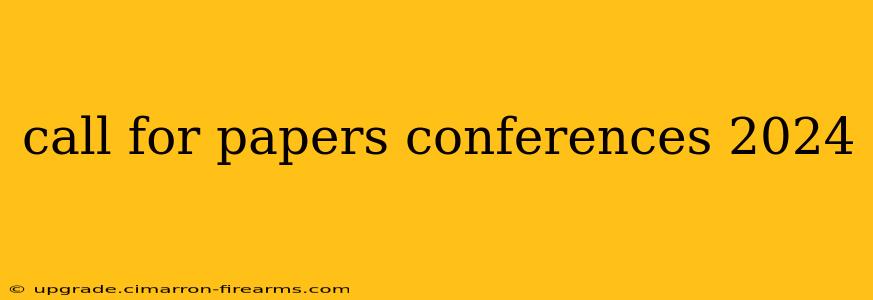Finding the right conference to present your research can be a daunting task. With hundreds of calls for papers (CFPs) emerging each year, navigating the options and crafting a compelling submission requires careful planning and strategy. This guide provides insights and actionable advice to help you successfully submit your work to conferences in 2024.
Understanding the Conference Landscape
Before diving into specific CFPs, it's crucial to understand the conference landscape. Consider these factors:
- Relevance: Does the conference's focus align perfectly with your research area? A strong match increases your chances of acceptance and engagement with your work.
- Reputation: Look for established conferences with a strong history and a high-impact publication record. Check the conference's website for information about past proceedings, keynote speakers, and attendees.
- Audience: Consider the target audience of the conference. Is it primarily academics, industry professionals, or a mix? Tailor your abstract and presentation accordingly.
- Submission Deadlines: Conferences often have strict deadlines. Keep a detailed calendar to ensure you meet all submission requirements on time.
- Publication Opportunities: Some conferences offer publication opportunities in peer-reviewed journals or conference proceedings. This can be a significant factor when choosing a conference to submit to.
Types of Conferences to Consider:
- Academic Conferences: These conferences are focused on presenting and discussing research findings within a specific academic discipline.
- Industry Conferences: These conferences are geared towards professionals in a specific industry, focusing on practical applications and emerging trends.
- International Conferences: These conferences provide opportunities to present your work to a global audience and network with researchers from around the world.
Crafting a Winning Conference Paper Proposal
A compelling conference paper proposal is the key to acceptance. Here's how to write a stand-out submission:
1. Thoroughly Review the CFP:
Before you begin writing, meticulously read the CFP. Pay close attention to:
- Submission Guidelines: Adhere strictly to formatting requirements, word limits, and submission methods.
- Keywords: Use relevant keywords from the CFP in your abstract and paper title.
- Topics of Interest: Ensure your research aligns with the specified themes and topics.
2. Write a Compelling Abstract:
Your abstract is your first and perhaps most crucial impression. Make it concise, clear, and persuasive. It should include:
- Background: Briefly introduce the research problem.
- Methods: Outline your research methodology.
- Results: Summarize the key findings.
- Conclusion: State the significance of your work.
3. Structure your Paper:
A well-structured paper is essential for clear communication. Consider a standard structure:
- Introduction: Set the context and state your research question.
- Literature Review: Summarize relevant previous work.
- Methodology: Describe your research methods in detail.
- Results: Present your findings clearly and concisely.
- Discussion: Analyze your results and discuss their implications.
- Conclusion: Summarize your findings and suggest future research directions.
4. Seek Feedback:
Before submitting, ask colleagues or mentors to review your proposal. Their feedback can help you identify areas for improvement and strengthen your submission.
Finding Calls for Papers (CFPs) for 2024
Numerous resources can help you locate CFPs:
- Conference websites: Directly check the websites of conferences relevant to your field.
- Academic Databases: Explore databases such as IEEE Xplore, ACM Digital Library, or Scopus.
- Google Scholar: Utilize advanced search operators to find conferences related to your research topic.
- Specialized websites: Many websites specifically list upcoming conferences and CFPs.
Conclusion:
Submitting a successful conference paper proposal requires careful planning, thorough research, and a strong understanding of the conference landscape. By following these guidelines and dedicating sufficient time and effort, you can significantly increase your chances of acceptance and contribute your valuable research to the academic or professional community. Remember to start early, manage your time effectively, and always double-check all submission requirements before hitting "submit." Good luck!

